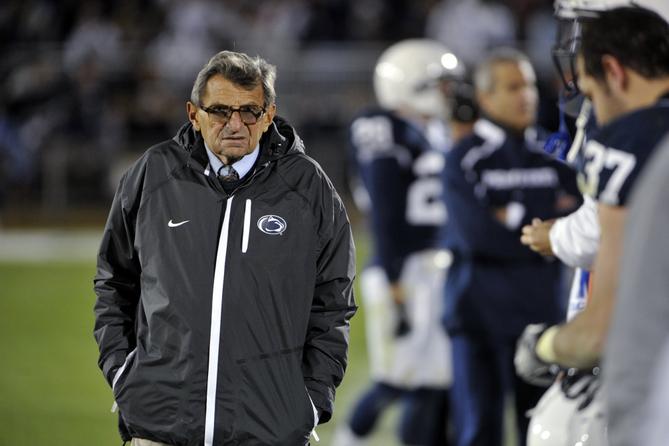This story was produced by the State College regional bureau of Spotlight PA, an independent, nonpartisan newsroom dedicated to investigative and public-service journalism for Pennsylvania. Sign up for our north-central Pa. newsletter, Talk of the Town, at spotlightpa.org/newsletters/talkofthetown.
STATE COLLEGE — A trustee’s resolution to name the Penn State football field at Beaver Stadium after former head coach Joe Paterno was introduced and then withdrawn only minutes later when Paterno’s son objected to the timing.
At the university Board of Trustees’ public meeting Friday, Anthony Lubrano, an alumni-elected representative, proposed “Paterno Field at Beaver Stadium” and the creation of a day specifically honoring the longtime coach and his wife, Sue.
“My fellow trustees, we have reached a moment of truth,” Lubrano said. “Are we going to honor two people who have literally given their lives in the pursuit of a better Penn State? Or are we going to allow fear mongering to prevail?”
Joe Paterno was Penn State’s head football coach for 45 years, and won two national championships, until the board fired him in November 2011 during the Jerry Sandusky child sex abuse scandal. Joe Paterno died in January 2012.
Some trustees were visibly uncomfortable as Lubrano read his resolution and Edward “Ted” Brown III, also an alumni-elected trustee, handed out copies of the speech.
Joseph “Jay” Paterno Jr., the former coach’s son and an alumni-elected trustee, said he visited his father’s grave Thursday morning, the day news broke that the board had discussed honoring the football coach in two closed-door meetings in January.
Penn State President Neeli Bendapudi and her administration do not support the idea of honoring Joe Paterno at this time, Jay Paterno said, and instead want to focus on existing challenges, such as the university’s budget deficit and upcoming cuts.
“At this moment, were Joe Paterno to be standing here right now, he would respect the president’s opinions,” Jay Paterno said. “He would not want the focus on him to be the issue of the day.”
Jay Paterno requested that “the resolution brought forward today be held for a future date, a date upon which time we’ve charted a course to meet the same vision and shared history of the two people we hope to honor.”
Lubrano withdrew his resolution following Jay Paterno’s comments, but suggested he might introduce it again in the future.
Trustee Brandon Short, who was elected by alumni, said that while he supported the resolution, the handling of the proposal insulted him. Short, who played for Joe Paterno in the 1990s, accused people of using the coach’s name for “stunts.”
“There are people here that no one would ever know if it wasn’t for the scandal and what happened to Joe Paterno,” Short said. “They use that constantly. Please stop. Stop. If you really wanted to do the resolution then put the resolution up and call for it. But to put it up and then pull it back means you never wanted it, and it doesn’t seem like you actually care about it.”
Jay Paterno then asked that there not be any further discussion on the topic, and board Chair Matthew Schuyler ended the board’s meeting seconds later.
In 2012, Sandusky was convicted on 45 counts of child sex abuse and sentenced to up to 60 years in prison. Former university President Graham Spanier, former athletic director Tim Curley, and former vice president Gary Schultz also served jail time related to the scandal. Spanier was convicted of child endangerment, a misdemeanor. Curley and Schultz pleaded guilty to the same offense. Joe Paterno was never charged.
Spotlight PA first reported how trustees met behind closed doors twice in January to discuss the proposal. The meetings — a Jan. 16 “briefing” and a Jan. 29 “executive session” — lasted for hours and might have violated state law that requires governing bodies to conduct business in public view, continuing a decadelong pattern of the board convening behind closed doors.
The university’s board is required under Pennsylvania’s open meetings law to deliberate its decisions in public. The law does allow groups to hold private executive sessions, but only to discuss specific topics — pending or current litigation, internal investigations, academic standings, and employment or property negotiations.
A Penn State spokesperson wrote of the Jan. 16 gathering that “counsel conducted this privileged informational briefing and no deliberation occurred.” The spokesperson added that trustees discussed “confidential and privileged matters” during their Jan. 29 executive session and that the private meeting was legal under the law’s exemptions.
In response to questions from Spotlight PA on the meetings, a Penn State spokesperson said the administration and board are focused on the president’s priorities.
On Friday, Schuyler said the Jan. 29 executive session was held to discuss “board initiatives.”
Spotlight PA, in partnership with the Reporters Committee for Freedom of the Press, sued the trustees in December for alleged violations of the Sunshine Act. The suit argues the trustees illegally conducted public business in private. University officials contend they have always followed the law, and the suit is pending in the Centre County Court of Common Pleas.
SUPPORT THIS JOURNALISM and help us reinvigorate local news in north-central Pennsylvania at spotlightpa.org/donate/statecollege. Spotlight PA is funded by foundations and readers like you who are committed to accountability and public-service journalism that gets results.
